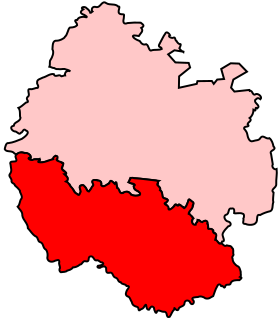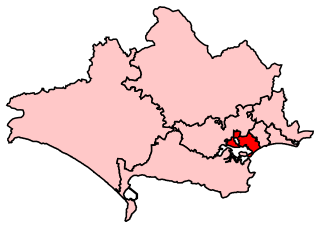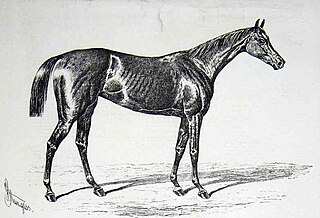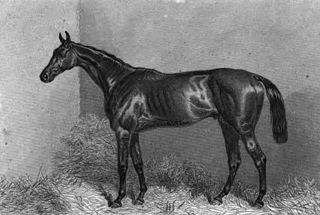
Hereford was, until 2010, a constituency of the House of Commons of the Parliament of the United Kingdom. Since 1918, it had elected one Member of Parliament (MP) by the first-past-the-post voting system.

Poole is a constituency represented in the House of Commons of the UK Parliament since 1997 by Robert Syms, a Conservative.

Beeston railway station is a Grade II listed railway station on the Midland Main Line which serves the town of Beeston in Nottinghamshire, England. It lies 3.2 miles (5.1 km) south-west of Nottingham railway station, and 750 metres (0.5 mi) south-east of Beeston transport interchange for local buses and Nottingham Express Transit trams. The station is managed by East Midlands Railway.

Lancaster was a constituency of the House of Commons of the Parliament of England then of the Parliament of Great Britain from 1707 to 1800 and of the Parliament of the United Kingdom from 1801 to 1867, centred on the historic city of Lancaster in north-west England. It was represented by two Members of Parliament until the constituency was disenfranchised for corruption in 1867.
Derby is a former United Kingdom Parliamentary constituency. It was a constituency of the House of Commons of the Parliament of England, then of the Parliament of Great Britain from 1707 to 1800 and of the Parliament of the United Kingdom from 1801 to 1950. It was represented by two members of parliament. It was divided into the single-member constituencies of Derby North and Derby South in 1950.
The 97th Regiment of Foot was an infantry regiment of the British Army, formed in 1824 and amalgamated into the Queen's Own in 1881.
Bridport was a parliamentary borough in Dorset, England, which elected two Members of Parliament (MP) to the House of Commons from 1295 until 1868, and then one member from 1868 until 1885, when the borough was abolished.
Plymouth was a parliamentary borough in Devon, which elected two members of parliament (MPs) to the House of Commons in 1298 and again from 1442 until 1918, when the borough was merged with the neighbouring Devonport and the combined area divided into three single-member constituencies.
Piers Calveley Claughton was an Anglican colonial bishop and author.

George John Trevor Spencer was an Anglican bishop in the 19th century and a member of the Spencer family.
Charles Leslie Dundas was an eminent Anglican priest in the late nineteenth and early twentieth centuries.
Thomas Stanton was the Archdeacon of Wilts from 1868 until 1874.

Vedette (1854–1881) was a British Thoroughbred racehorse who won the 2000 Guineas Stakes and two Doncaster Cups. He also sired Epsom Derby winner and Champion sire, Galopin. He was owned by Thomas Dundas, 2nd Earl of Zetland and trained by George Abdale.

Pilgrimage (1875–1897) was a British Thoroughbred racehorse. As a two-year-old she was only defeated once and won the Dewhurst Plate. She only raced three times as a three-year-old, winning the 2000 Guineas and 1000 Guineas, before finishing as the runner-up in the Oaks Stakes. After retiring from racing she became a successful broodmare, foaling Oaks winner Canterbury Pilgrim and Derby winner Jeddah.

Lord Clifden was a British Thoroughbred racehorse. He was undefeated as a two-year-old, including wins in the Woodcote Stakes and Champagne Stakes. As a three-year-old he was just beaten by a short-head in the Derby, before winning the St. Leger later in the season, despite being 100 yards behind the rest of the field at one point in the race. After an unsuccessful four-year-old campaign he was retired to stud and became champion sire of Great Britain and Ireland in 1876. He sired the St. Leger winners Hawthornden and Wenlock, the dual-Classic winners Petrarch and Jannette, as well as the champion sire Hampton. Lord Clifden was purchased by Carnegie Robert John Jervis, 3rd Viscount St Vincent, after his first race and was sold to Thomas Gee as a stallion. As the two and three-year-old he was trained by Edwin Parr, with William Bevill training him for his four-year-old season.
Thomas Henry Freer (1833–1904) was Archdeacon of Derby from 1891 to 1904.
William Ogle Moore was an Irish Anglican priest: he was Dean of Cashel from 1857 to 1861; and Dean of Clogher from 1862 to 1873.

Spencer Bulkeley Wynn was Deputy Lieutenant of Carnarvon from 1846 and High Sheriff of Anglesey in 1847.
This page is based on this
Wikipedia article Text is available under the
CC BY-SA 4.0 license; additional terms may apply.
Images, videos and audio are available under their respective licenses.








